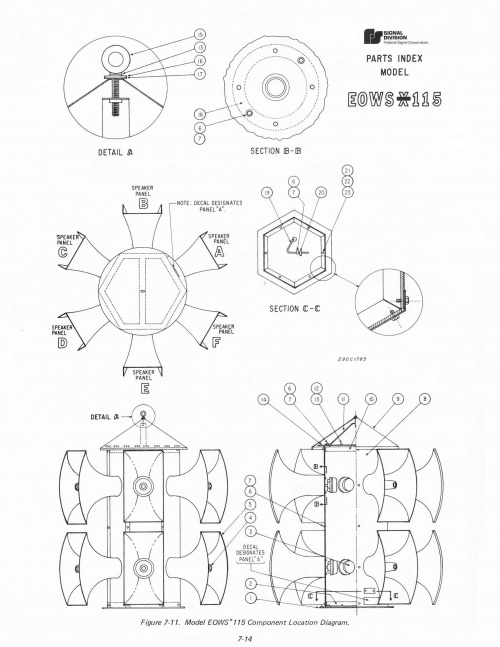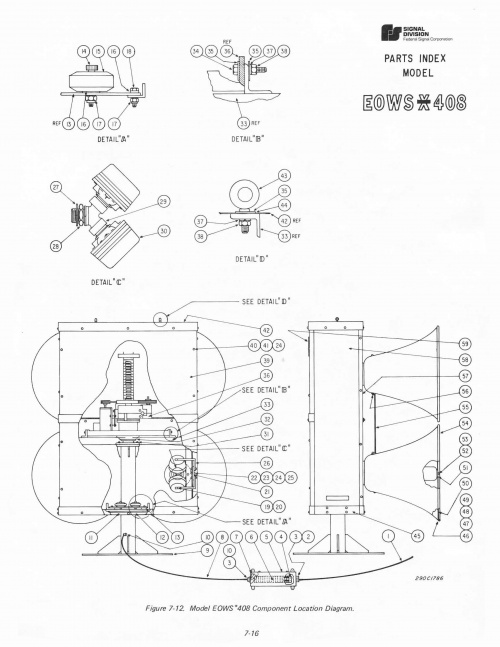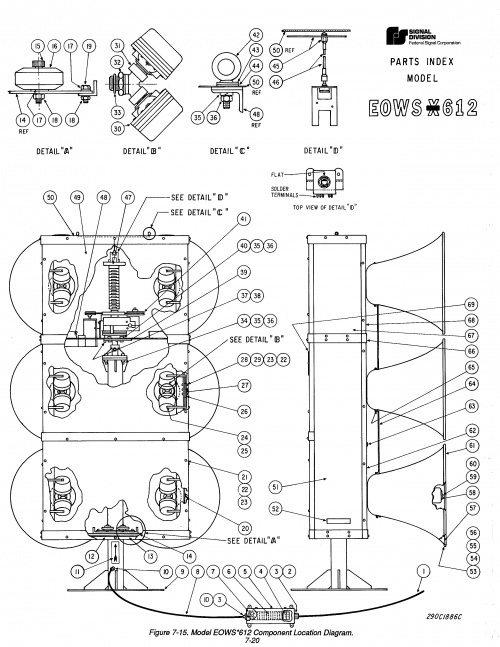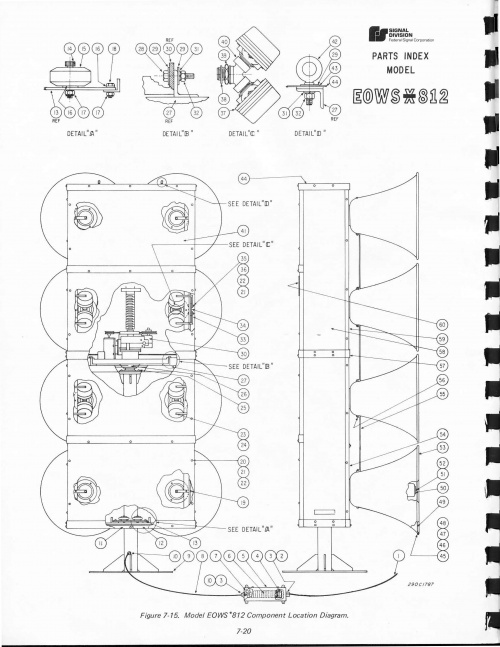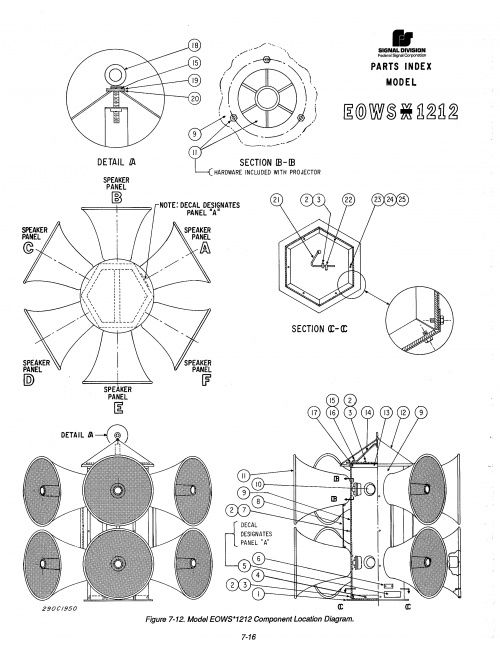EOWS: Difference between revisions
m (Added category.) |
m (Tyler moved page Federal Signal EOWS to EOWS: Organization) |
||
| (78 intermediate revisions by 10 users not shown) | |||
| Line 1: | Line 1: | ||
{{Infobox siren | {{Infobox siren|company=Federal Signal|produced=1981-2007|type=Rotational Electronic | ||
| | Omnidirectional Electronic|succeeded=[[Federal Signal Modulator]] | ||
| | [[Federal Signal DSA]]|output=113-124 dB @ 100 ft|image=OWS EOWS.jpg|caption=|wattage=800-1200 W|manual=https://drive.google.com/file/d/1RBPw1gfL2kY5WWTnaBMwv650ei7ZQDrw|voltage=24|current=DC|title=Federal Signal EOWS|sheet=https://wiki.thesirenboard.com/images/1/1c/EOWS612_Cut_Sheet.pdf}}The '''EOWS (Electronic Outdoor Warning Siren)'''<ref>(Electronic Outdoor Warning Siren)</ref> series, also known as the '''SiraTone''' series,<ref>(also known as the SiraTone series)</ref> was a series of electronic sirens that were produced by Federal Signal over a span of 20 years, coming in both omnidirectional and rotational models. It was Federal Signal's first attempt at making an electronic siren, and while they had some teething issues, the series proved to be a very popular option, competing with Whelen's [[Whelen WS-2000|WS-2000]], [[Whelen WS-3000|WS-3000]], and [[Whelen WPS-4000|WPS-4000]] sirens, and later ACA's [[ACA Alertronic|Alertronic]] sirens. | ||
| | |||
| | == History == | ||
| | |||
| | ===Early Production=== | ||
| | [[File:Proto_1212.jpg|200px|thumb|Former Zimmer unit still in service on a modern UltraVoice controller.]] | ||
| | The EOWS series came to light in 1980 when Federal Signal won a bid for an electronic siren system to be installed at the now coal-fired Zimmer nuclear plant. Federal Signal however did not have an electronic siren line, so this led to a new development they called '''SiraTone'''. Federal Signal produced around 30 model '''EOWS*115''' sirens for the plant system in 1981. The original system of 115s were later absorbed into surrounding communities after the Zimmer nuclear plant fell through. A few can be found today still in service, however most are on newer controllers. Federal created a very simple, yet effective electronic siren. It was a cluster of 12 speakers consisting of rectangular re-entrant horns made out of fiberglass, sourced from Atlas Sound along with the 100 Watt compression drivers behind them. The frame/enclosure was made custom by Federal Signal themselves. | ||
| | |||
| | ===Further Expansion=== | ||
| | After Federal Signal created this new product, they worked out some kinks with the SiraTone controller and expanded upon their electronic line with the introduction of the models '''408''', '''812''', and '''M*12'''. The 408 and 812 were rotating beam sirens made for better sound concentration and projection, while the M*12 was simply a mobile vehicular siren aimed for public events and such. Despite these new additions, the 115 was still available as the only ''omni-directional'' model they offered. | ||
| | |||
| | For the new rotating arrays, Federal chose a simple design similar to rotating signs of the time and struck a partnership with Dynapac Rotating as their supplier for their rotation mechanisms. These arrays featured Dynapac's K-25 rotator with a quad-brush collector ring assembly allowing the arrays to rotate a full 360° stall free, requiring little to no maintenance. Likewise, Federal also partnered up with University Sound (an Altec Lansing company) as the supplier for the 26" spun aluminum horns used for the EOWS*408 and 812. In early stages, the EOWS*812 and 408 were made in a more "compact" manner with the projection horns recessing into the rear frame. This was very short lived likely due to manufacturing troubles, and was ditched by 1983, with the horns being mounted directly to the frame wall. | ||
| | |||
Towards the end of 1984, Federal Signal introduced 2 new EOWS products, the '''1212''' and '''612'''. EOWS*1212 was simply a 115 with the 408 and 812's aluminum horns replacing the original rectangular fiberglass ones on the 115. This was done for a small boost in performance thanks to better sound propagation with the aluminum horns, while also unifying the product line with the existing models. EOWS*612 was a combination of the 408 and 812. It's performance matched the 812 while staying relatively compact like the 408. It also used less materials than the 812, making it much more economical, not to mention easier to handle/manage. With the introduction of said models, came the discontinuation of the 812 and 408. However the 115 stuck around as a cheaper base model EOWS that performed a little worse than the 1212. '''Discontinuation of the M*12 is unknown.''' | |||
The '''EOWS | ===Late Production and Discontinuation=== | ||
[[File:20-inch_ULs.jpg|200px|thumb|Smaller 20" variant of the speaker model used on the EOWS*408, 612, 812, and 1212.]] | |||
Federal Signal continued production of the EOWS*1212, 115 and 612 for a few years, eventually killing off the 115 sometime in 1988. The 90's rolled around and things started to change quite a bit. Federal Signal created a new omni-directional siren named the [[Modulator]] in 1990, leading to the demise of the EOWS*1212 the same year. However, Federal Signal kept the 612 in production, likely because it was their only rotating electronic siren at the time, it was efficient and powerful, and people still wanted to purchase them. They kept it up to date, modernizing it with their latest [[MC]] controller at the time. The EOWS*612 stuck around for many years into the future. However, Federal Signal removed it from their public websites in 2001 and only offered it as a special order model from 2001 up into 2007, with sales ending completely that year with their last model selling on August 3rd, 2007. Federal Signal unfortunately had to discontinue production on the EOWS*612 because they could no longer get speakers for them. Altec Lansing almost went bankrupt, meaning they had to do major budget cuts. To cut their losses, they killed off their University Sound branch, leaving Federal with no source for speakers. | |||
===Modern Use=== | |||
All EOWS units are fairly simplistic electronic sirens, and are easy to update with modern hardware. Many units still in service are on the latest [[UltraVoice]] controller from Federal Signal. Many are on older Federal controllers, like the [[MC]] and [[MCP]]. Some units are even on third party controllers like ones by [[American Signal Corporation]] as well as [[Whelen Engineering]]. The units were originally manufactured with simple common components, meaning they were easy to repair if needed. | |||
While the 612 was still in production, it received upgrades from Federal Signal with their newer [[MC]] controller, then the [[MCP]] controller, and later their [[UV]] controller. Federal Signal still supports EOWS*612 too. The [[UltraVoice]] controller openly states it's compatibility with the 612 in its documentation, earlier documentation stated it's compatibility with the 1212 as well. However, [[UV]] isn't limited to just the 612 and 1212. Any model EOWS siren is fully compatible with the [[UV]]. A few EOWS*408 units in Massachusetts were fitted with UltraVoice controllers in the early 2000s. Unfortunately these units were replaced by Modulator 5020s in the mid-2000s. | |||
== Models == | == Models == | ||
===EOWS*115=== | |||
The '''EOWS*115''' is a very simple siren, with a tall hexagonal fiberglass housing containing 12 100 W speaker drivers, as well as the wiring. A small rainshield on top helps protect the electronics. The siren uses 12 rectangular fiberglass Atlas CJ-44 horns, which aren't very efficient. Because of this, the EOWS*115 has the lowest performance of the EOWS series, being only 113 dB at 100 ft. However, it also costed the least, and even after the EOWS*1212 was introduced, the 115 continued to be sold. The first model in the EOWS series, these are almost identical to the Zimmer units, with the only difference being the improved SiraTone controller which fixed many of the issues the Zimmer units had. | |||
===EOWS*408=== | |||
The '''EOWS*408''' is a rotational siren that was introduced sometime after 1981, alongside the 812. The EOWS*408 was a compact, small rotating electronic siren that made use of 8 100 W speaker drivers, with two drivers per horn. The EOWS*408 only used 4 horns and used University Sound DR-42 aluminum speakers which offered better performance than the Atlas speakers. Originally, the speakers were recessed into the siren's housing, but due to manufacturing troubles the speakers were changed to be bolted directly onto the housing in 1983. The EOWS*408 utilized a Dynapac K-25 rotator along with collector rings to allow the siren unit to rotate 360 degrees. It was introduced as the cheaper, less powerful option compared to the larger EOWS*812 and reached 119 dB at 100 ft. | |||
=== EOWS* | ===EOWS*812=== | ||
The '''EOWS* | The '''EOWS*812''' was the other rotational option introduced in 1981, with twice the speakers of the EOWS*408. The EOWS*812 is the tallest siren in the series, using the exact same rotator mechanism and horns from the EOWS*408. The four speakers in the middle of the siren have 2 100 W drivers each, while the top and bottom rows of horns have only a single 100 W speaker driver per horn for a total of 12 drivers. This siren wasn't very economical, but its performance was great, outputting 124 dB at 100 ft. Like the EOWS*408, the EOWS*812 was redesigned in 1983, with its speakers now being bolted directly onto the housing. | ||
=== EOWS*M12 === | === EOWS*M12 === | ||
The '''EOWS*M12''', or ''' | The '''EOWS*M12''' was a vehicular siren intended for short-range notification, and not much is known about it. It was meant for use as a mobile public notification system, to be mounted to the roof of a police car or van at large events. These were built with 4 Atlas CJ-44 horns (the same used on the EOWS*115) attached to a small housing with 4 small drivers. These were quite large and took up nearly the whole roof of the car. The only known sound rating is 123 dB at 10 ft. | ||
In 1984, the EOWS*408 and EOWS*812 were discontinued and replaced with the EOWS*612 and EOWS*1212, which offered superior performance. The EOWS*115 would continue to be sold as a more cost-effective option, alongside the EOWS*1212 until it was discontinued in 1988. The EOWS*M12 would likely be discontinued around the same time. | |||
===EOWS*1212=== | |||
The '''EOWS*1212''' was introduced in 1984 and was designed as a higher-performance version of the EOWS*115. The EOWS*1212 is entirely identical to the EOWS*115, except for the speakers used. The EOWS*1212 uses the same University Sound DR-42 speakers that the EOWS*408, 812, and 612 use, instead of the Atlas speakers the 115 used. Because of this, the EOWS*1212 offered better performance, reaching 115 dB at 100 ft. While it was better in performance than the EOWS*115, it was also more expensive. Because of this, the EOWS*115 remained in production alongside the EOWS*1212 as a cheaper, lower-performing option. The EOWS*1212 would be discontinued in 1990, being directly replaced by Federal Signal's [[Federal Signal Modulator|Modulator]] which was released the same year. | |||
===EOWS*612=== | |||
The '''EOWS*612''' is the most popular option in the EOWS series, as well as its longest-lived. The EOWS*612 was introduced in 1984 alongside the EOWS*1212 to replace the EOWS*408 and 812. The EOWS*612 matched the sound output of the EOWS*812 while being nearly as compact as the EOWS*408, leading it to being the best of both worlds. The EOWS*612 uses six University Sound speakers, with 2 100 W drivers per speaker for a total of 12. Because of this, it was able to output 124 dB at 100 ft, the same as the EOWS*812. | |||
==Diagrams== | |||
===EOWS*115=== | |||
[[File:EOWS-115-diagram.jpg|500px]] | |||
===EOWS*408=== | |||
[[File:EOWS-408-diagram.jpg|500px]] | |||
===EOWS*612=== | |||
[[File:EOWS-612-diagram.jpg|500px]] | |||
===EOWS*812=== | |||
[[File:EOWS812_Manual.jpg|500px]] | |||
===EOWS*1212=== | |||
[[File:EOWS-1212-diagram.jpg|500px]] | |||
==Example Videos== | |||
* {{Link-inline-video |link=RwZP5xQZMTY |name=A Federal Signal EOWS*812 sounding in the “Steady” tone in Harvey County, Kansas. }} | |||
* {{Link-inline-video |link=VAUtHaWBttE&pp |name=A Federal Signal EOWS*115 sounding a short alert in Rapid City, South Dakota}} | |||
== References == | == References == | ||
| Line 64: | Line 75: | ||
[[Category:Sirens]][[Category:Federal Signal Corporation]][[Category:Single Toned Sirens]][[Category:Dual Toned Sirens]][[Category:Directional Sirens]][[Category:Omnidirectional Sirens]][[Category:Rotating Sirens]][[Category:Electronic Sirens]] | [[Category:Sirens]][[Category:Federal Signal Corporation]][[Category:Single Toned Sirens]][[Category:Dual Toned Sirens]][[Category:Directional Sirens]][[Category:Omnidirectional Sirens]][[Category:Rotating Sirens]][[Category:Electronic Sirens]] | ||
__INDEX__ | |||
Latest revision as of 01:46, 29 August 2024
| Federal Signal EOWS | |
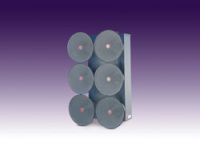
| |
| Company | Federal Signal |
|---|---|
| Produced | 1981-2007 |
| Type | Rotational Electronic
Omnidirectional Electronic |
| Sound output | 113-124 dB @ 100 ft |
| Wattage | 800-1200 W |
| Voltage | 24 V DC |
| Succeeded by | Federal Signal Modulator |
| Documentation | Manual Product sheet |
The EOWS (Electronic Outdoor Warning Siren)[1] series, also known as the SiraTone series,[2] was a series of electronic sirens that were produced by Federal Signal over a span of 20 years, coming in both omnidirectional and rotational models. It was Federal Signal's first attempt at making an electronic siren, and while they had some teething issues, the series proved to be a very popular option, competing with Whelen's WS-2000, WS-3000, and WPS-4000 sirens, and later ACA's Alertronic sirens.
History
Early Production
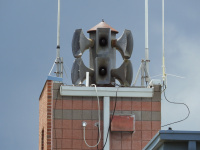
The EOWS series came to light in 1980 when Federal Signal won a bid for an electronic siren system to be installed at the now coal-fired Zimmer nuclear plant. Federal Signal however did not have an electronic siren line, so this led to a new development they called SiraTone. Federal Signal produced around 30 model EOWS*115 sirens for the plant system in 1981. The original system of 115s were later absorbed into surrounding communities after the Zimmer nuclear plant fell through. A few can be found today still in service, however most are on newer controllers. Federal created a very simple, yet effective electronic siren. It was a cluster of 12 speakers consisting of rectangular re-entrant horns made out of fiberglass, sourced from Atlas Sound along with the 100 Watt compression drivers behind them. The frame/enclosure was made custom by Federal Signal themselves.
Further Expansion
After Federal Signal created this new product, they worked out some kinks with the SiraTone controller and expanded upon their electronic line with the introduction of the models 408, 812, and M*12. The 408 and 812 were rotating beam sirens made for better sound concentration and projection, while the M*12 was simply a mobile vehicular siren aimed for public events and such. Despite these new additions, the 115 was still available as the only omni-directional model they offered.
For the new rotating arrays, Federal chose a simple design similar to rotating signs of the time and struck a partnership with Dynapac Rotating as their supplier for their rotation mechanisms. These arrays featured Dynapac's K-25 rotator with a quad-brush collector ring assembly allowing the arrays to rotate a full 360° stall free, requiring little to no maintenance. Likewise, Federal also partnered up with University Sound (an Altec Lansing company) as the supplier for the 26" spun aluminum horns used for the EOWS*408 and 812. In early stages, the EOWS*812 and 408 were made in a more "compact" manner with the projection horns recessing into the rear frame. This was very short lived likely due to manufacturing troubles, and was ditched by 1983, with the horns being mounted directly to the frame wall.
Towards the end of 1984, Federal Signal introduced 2 new EOWS products, the 1212 and 612. EOWS*1212 was simply a 115 with the 408 and 812's aluminum horns replacing the original rectangular fiberglass ones on the 115. This was done for a small boost in performance thanks to better sound propagation with the aluminum horns, while also unifying the product line with the existing models. EOWS*612 was a combination of the 408 and 812. It's performance matched the 812 while staying relatively compact like the 408. It also used less materials than the 812, making it much more economical, not to mention easier to handle/manage. With the introduction of said models, came the discontinuation of the 812 and 408. However the 115 stuck around as a cheaper base model EOWS that performed a little worse than the 1212. Discontinuation of the M*12 is unknown.
Late Production and Discontinuation
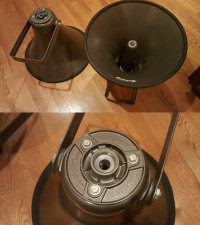
Federal Signal continued production of the EOWS*1212, 115 and 612 for a few years, eventually killing off the 115 sometime in 1988. The 90's rolled around and things started to change quite a bit. Federal Signal created a new omni-directional siren named the Modulator in 1990, leading to the demise of the EOWS*1212 the same year. However, Federal Signal kept the 612 in production, likely because it was their only rotating electronic siren at the time, it was efficient and powerful, and people still wanted to purchase them. They kept it up to date, modernizing it with their latest MC controller at the time. The EOWS*612 stuck around for many years into the future. However, Federal Signal removed it from their public websites in 2001 and only offered it as a special order model from 2001 up into 2007, with sales ending completely that year with their last model selling on August 3rd, 2007. Federal Signal unfortunately had to discontinue production on the EOWS*612 because they could no longer get speakers for them. Altec Lansing almost went bankrupt, meaning they had to do major budget cuts. To cut their losses, they killed off their University Sound branch, leaving Federal with no source for speakers.
Modern Use
All EOWS units are fairly simplistic electronic sirens, and are easy to update with modern hardware. Many units still in service are on the latest UltraVoice controller from Federal Signal. Many are on older Federal controllers, like the MC and MCP. Some units are even on third party controllers like ones by American Signal Corporation as well as Whelen Engineering. The units were originally manufactured with simple common components, meaning they were easy to repair if needed.
While the 612 was still in production, it received upgrades from Federal Signal with their newer MC controller, then the MCP controller, and later their UV controller. Federal Signal still supports EOWS*612 too. The UltraVoice controller openly states it's compatibility with the 612 in its documentation, earlier documentation stated it's compatibility with the 1212 as well. However, UV isn't limited to just the 612 and 1212. Any model EOWS siren is fully compatible with the UV. A few EOWS*408 units in Massachusetts were fitted with UltraVoice controllers in the early 2000s. Unfortunately these units were replaced by Modulator 5020s in the mid-2000s.
Models
EOWS*115
The EOWS*115 is a very simple siren, with a tall hexagonal fiberglass housing containing 12 100 W speaker drivers, as well as the wiring. A small rainshield on top helps protect the electronics. The siren uses 12 rectangular fiberglass Atlas CJ-44 horns, which aren't very efficient. Because of this, the EOWS*115 has the lowest performance of the EOWS series, being only 113 dB at 100 ft. However, it also costed the least, and even after the EOWS*1212 was introduced, the 115 continued to be sold. The first model in the EOWS series, these are almost identical to the Zimmer units, with the only difference being the improved SiraTone controller which fixed many of the issues the Zimmer units had.
EOWS*408
The EOWS*408 is a rotational siren that was introduced sometime after 1981, alongside the 812. The EOWS*408 was a compact, small rotating electronic siren that made use of 8 100 W speaker drivers, with two drivers per horn. The EOWS*408 only used 4 horns and used University Sound DR-42 aluminum speakers which offered better performance than the Atlas speakers. Originally, the speakers were recessed into the siren's housing, but due to manufacturing troubles the speakers were changed to be bolted directly onto the housing in 1983. The EOWS*408 utilized a Dynapac K-25 rotator along with collector rings to allow the siren unit to rotate 360 degrees. It was introduced as the cheaper, less powerful option compared to the larger EOWS*812 and reached 119 dB at 100 ft.
EOWS*812
The EOWS*812 was the other rotational option introduced in 1981, with twice the speakers of the EOWS*408. The EOWS*812 is the tallest siren in the series, using the exact same rotator mechanism and horns from the EOWS*408. The four speakers in the middle of the siren have 2 100 W drivers each, while the top and bottom rows of horns have only a single 100 W speaker driver per horn for a total of 12 drivers. This siren wasn't very economical, but its performance was great, outputting 124 dB at 100 ft. Like the EOWS*408, the EOWS*812 was redesigned in 1983, with its speakers now being bolted directly onto the housing.
EOWS*M12
The EOWS*M12 was a vehicular siren intended for short-range notification, and not much is known about it. It was meant for use as a mobile public notification system, to be mounted to the roof of a police car or van at large events. These were built with 4 Atlas CJ-44 horns (the same used on the EOWS*115) attached to a small housing with 4 small drivers. These were quite large and took up nearly the whole roof of the car. The only known sound rating is 123 dB at 10 ft.
In 1984, the EOWS*408 and EOWS*812 were discontinued and replaced with the EOWS*612 and EOWS*1212, which offered superior performance. The EOWS*115 would continue to be sold as a more cost-effective option, alongside the EOWS*1212 until it was discontinued in 1988. The EOWS*M12 would likely be discontinued around the same time.
EOWS*1212
The EOWS*1212 was introduced in 1984 and was designed as a higher-performance version of the EOWS*115. The EOWS*1212 is entirely identical to the EOWS*115, except for the speakers used. The EOWS*1212 uses the same University Sound DR-42 speakers that the EOWS*408, 812, and 612 use, instead of the Atlas speakers the 115 used. Because of this, the EOWS*1212 offered better performance, reaching 115 dB at 100 ft. While it was better in performance than the EOWS*115, it was also more expensive. Because of this, the EOWS*115 remained in production alongside the EOWS*1212 as a cheaper, lower-performing option. The EOWS*1212 would be discontinued in 1990, being directly replaced by Federal Signal's Modulator which was released the same year.
EOWS*612
The EOWS*612 is the most popular option in the EOWS series, as well as its longest-lived. The EOWS*612 was introduced in 1984 alongside the EOWS*1212 to replace the EOWS*408 and 812. The EOWS*612 matched the sound output of the EOWS*812 while being nearly as compact as the EOWS*408, leading it to being the best of both worlds. The EOWS*612 uses six University Sound speakers, with 2 100 W drivers per speaker for a total of 12. Because of this, it was able to output 124 dB at 100 ft, the same as the EOWS*812.
Diagrams
EOWS*115
EOWS*408
EOWS*612
EOWS*812
EOWS*1212
Example Videos
 A Federal Signal EOWS*812 sounding in the “Steady” tone in Harvey County, Kansas.
A Federal Signal EOWS*812 sounding in the “Steady” tone in Harvey County, Kansas. A Federal Signal EOWS*115 sounding a short alert in Rapid City, South Dakota
A Federal Signal EOWS*115 sounding a short alert in Rapid City, South Dakota
